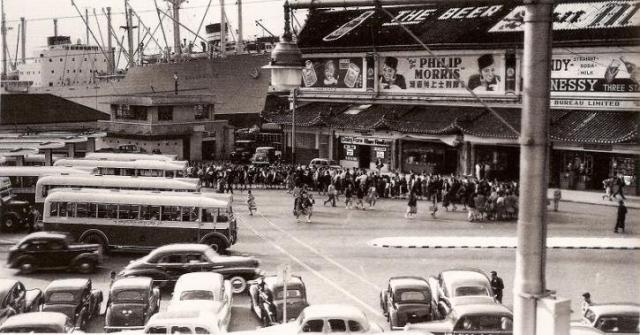Star Ferry Pier at Tsim Sha Tsui in 1950s?
There are many curious photos in this site, and I have not seen the above one on Star Ferry Pier at Tsim Sha Tsui as in 1950s.
http://oceandeeop3000.blogspot.jp/2012_08_01_archive.html
However, reading the descriptions below, I wondered whether the above photo was really taken in 1950s. Because according to the description below on KMB, they began to use “Double Decker from1949, but as shown in the above photo there’s no “Double” at the terminal. The photo might be taken in 1940s, not in 1950s. How do you feel?
Main article: Bus services in Hong Kong:
The former British colony of Hong Kong introduced its first double-decker buses in 1949 by Kowloon Motor Bus. They have become very popular since then, and they are found in large numbers among the fleets of the territory's major bus operators (see below). By law, double-decker buses in Hong Kong are limited to a length of 12.8 metres (42 feet). Today, the majority of buses running in Hong Kong are double-decker buses, and all of them are air-conditioned. Also, Hong Kong has a double-deck trams system, one of three only in the world as of 2015 and the only fleet which is all double-deck.
https://en.wikipedia.org/wiki/Double-decker_bus
Double-decker buses in Hong Kong, owned by Kowloon Motor Bus:
By 1940, KMB had 140 single-deckers operating on 17 routes. As only a handful of buses survived World War II, some lorries were temporarily converted into buses. By the late 1940s, KMB ridership increased with the huge influx of immigration from China. In 1949, KMB bought 20 Daimler double-deckers from England, becoming the first operator of double-deckers in Hong Kong.
https://en.wikipedia.org/wiki/Kowloon_Motor_Bus
Gen

Comments
Double Decker Buses
My first ride was in 1951 in their first generation double decker which had one entrance in the back. Later, a second entrance was added at the front on larger units and I was impressed how the conductor could operate both gates from the back. Service was inadequate and the buses on my route were often full. Sometimes he had to deal with men who held on to the closed gate as the bus took off.
This could be a morning scene in early 1950s with me and grandma among these folks. The line here to buy train ticket was short and fast, but not at the border where the waiting time was very long. One time, a female guard checked the pockets of this little boy for things that might be illegal. Thus, our TST morning train reached Canton at supper time. Now, the trip I heard takes about an hour. Amazing progress!
Debut of KMB Double Decker Buses
HK Sunday Herald 17 April 1949
Four modern double-decker buses will make their debut today on the bus route between Tsim Sha Tsui and Kowloon City.
Throwing it out there: can…
Throwing it out there: can anyone identify the ship?
The Philip Morris bell boy ads do date from the 1940s and was already pointed out, the KMB buses here are not double-decker buses, which were introduced on 17th April 1949 (but it's possible they were not caught on this particular photo)
Belleville ???
A slightly better photo: https://www.shipsnostalgia.com/media/kowloon-wharf.477969/
The freighter, Belleville ?
Excellent find moddsey!…
Excellent find moddsey!
Looks like a good match c.f. with known photo here.
Built in Göteborg, Sweden and launched 8th September 1948 and delivered December 1948. Grounded 24th September 1957 on Seat Ledge, Brenton Reef near Newport, RI, USA whilst on a voyage from Singapore via New York, NY, USA, Boston, MA, USA and Philadelphia, PE, USA to Houston, TX, USA.
At least for a start we can date this photo from 1949 to 1956 (last known year of tracks from KCR terminus to Kowloon wharves)